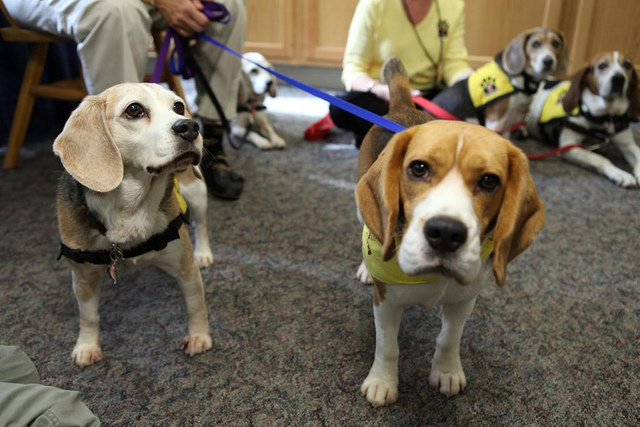Service dogs allowed on East Bay campus
Photo courtesy of PennStateNews via Flickr
Casey and Denver greet visitors — and the camera — at Pet Therapy Awareness Day at Penn State Hershey Medical Center.
November 16, 2017
Demand for emotional support and service dogs on the rise
Emily Wood, a graduate student working towards her master in social work at Cal State East Bay, brings her dog, Wisdom, with her to school everyday. Wood is visually impaired and Wisdom helps her get around campus.
Emily’s eyesight is comparable to looking out through a car window on a rainy day, only able to see blurry shadows passing by. Nighttime is a big challenge for Emily but her dog has been trained to be her eyes, which comes in handy when navigating across the street and over sidewalks.
In 2015, however, she had some difficulty getting Wisdom to live with her on campus.
“All roommates had to agree, in which mine didn’t, in regards to have dogs live in the room. I ended up living at home in San Jose and commuted every day on BART,” said Emily.
Dogs were not allowed in the dorms until fall 2016, according to the Cal State East Bay Student Housing and Residence Life Assistance Animals Policy. The policy also states that a student has to qualify with a document stating their condition in order to allow them to bring their service animal on campus.
“Wisdom lets me knows when there are curves, helps me when we cross the street,” Wood said. “She takes me to stairs and benches because I can’t see those things. She knows my route and she even takes me to the exact door I work at.”
In August, Cal State East Bay, along with other universities including UC Berkeley and San Jose State, conducted a study among California college campuses and noted an increase in students requesting approval of emotional support animals, according to Study Breaks.
All colleges now recognize the importance of “Service Animals” as defined by the Americans with Disabilities Act (ADA) and the broader category of “Emotional Support Animals” under the Fair Housing Act that provides physical and emotional support to students with disabilities, allowing students to bring their service dogs on campus as well as in the dorms.
Dogs have been a big help not only to disabled students, but stressed out students as well.
On Oct. 18, Pause for Paws was on campus in order to help students during a stressed-filled week of studying. Elizabeth Ghobriel, health educator at Cal State East Bay, invites volunteers from the Valley Humane Society who bring their dogs on campus as well as other places in need of therapy, such as elderly homes.
Rick Hemika, a volunteer from the Valley Humane Society, brings his dog, Fulton, to East Bay’s campus twice a quarter during midterms and finals, a highly stressful time for students. He hopes his dog can serve as a social catalyst for communication among students.
“Bringing dogs on campus has improved communication in which dogs become a conversation starter between students,” Hemika told The Pioneer. “It allows them to enjoy the dogs Valley Humane Society brings as well as getting their mind off upcoming exams.”
As of March 15, 2011, only dogs and pigs are recognized as service animals under Titles II and III of the Americans with Disabilities Act (ADA) in which final regulations were originally implemented on Sept. 15, 2010.
Service animals were not allowed on most college campuses until the United States v. University of Nebraska at Kearney case, which involved two former students with disabilities who were denied access to have their dogs with them on campus and in their living area. The outcome was a change in the housing policies on college campuses to allow persons with psychological disabilities to be granted with the access of their animals anywhere on campus to provide necessary therapeutic help, according to the United States Department of Justice.
Congress passed the Americans with Disabilities Amendment Act (ADAA) in 2008, changing the rules and regulations for college students in allowing their service animal on campus. The Department of Justice’s final rule on the regulations under the ADA defines a service animal as a dog that is individually trained to perform tasks or to do work for an individual with a disability, including a physical, sensory, psychiatric, intellectual or other mental disability.
Performing work for an individual with disabilities may include an animal that has the ability to assist a person with a psychiatric disorder by sensing when the person is about to have an episode and responds by nudging, barking or leading the individual away from the location inciting the episode.
Between helping students who are facing the stress of school or who need the help due to a disability, according to the Service Animal Registry.









